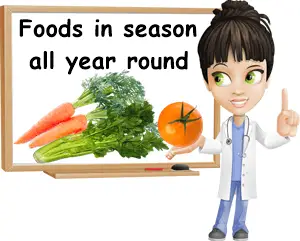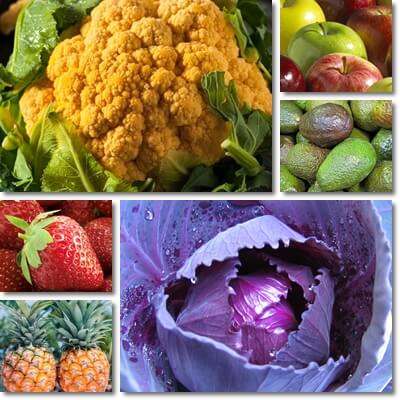A lot of seasonal foods are available year-round nowadays. Fruits such as strawberries, bananas and avocado, vegetables such as carrots, broccoli and onions, leafy greens such as spinach, kale and collards, as well as fruits and vegetables used for seasoning such as lemon and garlic are grown around the world, outside their initial area of cultivation, to produce off-season, year-round crops.
While eating what’s in season is often healthier because it means access to fresher foods that are also commonly grown locally, eating off season does provide much needed variety to the diet, and essential nutrients with important benefits for health. Discover what’s in season all year round and the biggest benefits for health of each of the foods available year round.

What’s in season year-round?
Apples
Whatever the time of the year, apples are in season and readily available. Apples have overall poor nutrition, but provide good amounts of dietary fiber for constipation relief and digestive health. Apples are a source of pectin and can be used cooked to calm digestive upset and help with recovery after diarrhea.
Avocado
Avocado is available year-round making for a virtually endless supply of the fruit. Eating avocado is good for high cholesterol, providing 6.7 g of dietary fiber and healthy fats, and a good source of potassium with benefits for high blood pressure.
Bananas
Bananas are high in manganese which helps prevent bone loss and loss of cartilage, and boosts fertility. Bananas are also high in vitamin B6 which helps produce hemoglobin and boosts the capacity of hemoglobin to absorb oxygen, actively helping combat anemia and associated symptoms such as fatigue and muscle weakness.

Beans
Beans are an all year-round food because they are cultivated extensively, including outside their original area of cultivation, and because they can be dried and used as such for up to a year. Beans are good to eat in pregnancy because they are high in iron and vitamin B9 with benefits for anemia and fatigue. Eating beans contributes to bone health and lowers blood pressure numbers.
Bell peppers
Bell peppers are always present on supermarket shelves and a great source of nutrition. They are extremely high in vitamin C with anti-inflammatory and antioxidant benefits. Each bell pepper color has unique benefits for health. Red and orange bell peppers are good for visual acuity, yellow bell peppers help reduce risks of cataract, while purple bell peppers have anticancer properties.
Broccoli
Between cultivation taking place both in the northern and the southern hemisphere, and the vegetable being grown extensively, broccoli is available all year round. Broccoli contains natural organic sulfur compounds whose metabolites have scientifically proven anticancer properties.
Cabbage
Cabbage is high in vitamins C and K with anti-inflammatory benefits, and boosts gut bacteria populations and health. Cabbage is a good source of vitamins B6 and B9 with anti-anemia properties and benefits for pregnant women.
Carrots
High in xanthophyll antioxidants, yellow carrots can help lower risks of cataract and age related macular degeneration. Purple carrots and black carrots are high in anthocyanins with anticancer properties. Red carrots are high in lycopene with blood pressure lowering properties.
Cauliflower
Originally a winter vegetable, cauliflower is now cultivated year-round in both hemispheres. The vegetable is high in vitamin C and vitamins B5, B6 and B9 with anti-inflammatory benefits and benefits for energy metabolism. Purple cauliflower provides pigmented anthocyanin antioxidants with anti-inflammatory and anticancer properties.
Celery
Celery grown for its crispy stalks and celery grown for its leaves are both available year round. All celery varieties cause allergic reactions, but if you can eat celery, then know that it’s a good source of vitamin K with anti-inflammatory benefits and benefits for bones and teeth and cardiovascular health.
Chard
Chard is high in magnesium, potassium and manganese with benefits for high blood pressure and fertility. Chard is grown in two seasons which makes it available all year round. The leafy green vegetable is very low in calories, only 20 kcal per 100 g, which makes it an ideal food for weight loss diets. High in non-heme iron, chard helps combat tiredness and fatigue.
Chili peppers
Chili peppers are pepper varieties that contain pungent capsaicinoid compounds such as capsaicin. Chilis have an extremely high content of vitamin C, and are a good source of vitamin B6, iron, magnesium and potassium.
Coconuts
Coconuts are available year round either as fresh fruits, or processed in the form of coconut meat, coconut flakes, coconut milk and coconut water. Eating coconuts boosts fertility in men and women thanks to a good content of manganese and zinc, and has anti-hypertensive benefits and tonic properties.
Collard greens (collards)
Collards are an important anti-inflammatory food, and provide good amounts of vitamin B6 which actively helps combat anemia, fatigue and muscle weakness. Collard greens are high in manganese which boosts fertility, and lower risks of osteoporosis by preventing bone loss and contributing to bone formation.
Cucumbers
With only 16 kcal/100 g, cucumbers are a very low-calorie food, good for weight loss diets. High in water, they are hydrating, and provide small amounts of several essential vitamins and minerals with a tonic, restorative effect. And owed to their extensive cultivation, they are never not available.
Garlic
Eating garlic is good for building up immunity and has natural anti-parasitic effects against intestinal parasites and worms. Garlic contains selenium which is good for thyroid health, and is high in manganese and vitamins B6 and C.
Ginger
Ginger is available year-round, either fresh as whole ginger root or ginger root pieces, or dried as ginger powder. Ginger is a natural antiemetic that helps combat nausea and prevent vomiting, and has pregnant anticlotting properties.
Grapefruit
Grapefruit is available year-round, with peak season being fall through winter and well into spring. The bitter flavors of the citrus fruit recommend it as a digestif, stimulating bile production for optimal digestion. Grapefruit is high in vitamin C and good for skin, teeth and gums and the immune system.
Kale
A serving of 100 g of cooked kale has 4 times the recommended daily intake of vitamin K for the average adult, 50% vitamin C and 20% manganese. The seasonal winter vegetable has anti-bleeding effects, supports the immune system, lowers inflammation levels in the body, reduces risks of osteoporosis and boosts fertility.
Kiwifruit
Kiwifruit provides high amounts of vitamin C which stimulates the production of collagen in the skin for better skin elasticity and antiaging benefits. Zespri SunGold golden kiwifruit is more than 50% higher in vitamin C than green kiwifruit, but green kiwifruit and kiwi berries are higher in vitamin K.
Kohlrabi
Kohlrabi is a pale green or purple bulbous vegetable with crisp, rather bland white flesh and a faint cruciferous scent. While it’s available year-round, it’s naturally a cool weather crop in peak season fall through spring. Kohlrabi is high in vitamin C with anti-inflammatory benefits and antiaging benefits for skin. Kohlrabi also has anti-hypertensive effects.
Lemons
Lemon trees actually produce fruit year-round in warm climates. Lemons have a good content of vitamin C with benefits for for gums and teeth health, and have anti-inflammatory effects. The juice However, lemons are high in organic acids which makes a food to avoid in active gastritis, severe acid reflux and peptic ulcers.
Limes
Just like lemons, limes are also available year-round. While not very nutritious, limes are a good source of vitamin C with anti-inflammatory, antioxidant and antiaging properties, and help preserve gum health and teeth integrity.
Mango
With two seasons in the northern hemisphere and southern hemisphere, mango fruit are available all year round. Mangoes have a good content of vitamin C with antioxidant, anti-inflammatory and antiaging properties. The fruit are also high in beta-carotene, a pro-vitamin A antioxidant with benefits for eyesight.
Onion
Onions are one of the most flavorful foods available, and they’re cultivated year round. Raw onions have a high content of naturally-occurring organic sulfur compounds with scientifically proven anti-proliferative, anti-inflammatory and immune-stimulating properties.
Parsley
Parsley is never not available and that’s a good thing. Fresh parsley is an extreme source of vitamin K with anti-inflammatory benefits, and high in vitamin C with antiaging effects. It’s high in iron, potassium and vitamins A and B9 with multiple benefits for health.
Pears
Pears are available all year round: they’re either in season, from fall and late fall harvests, or store extremely well over winter and well into spring. Pears have mild anti-hypertensive benefits and provide good amounts of copper and dietary fiber with antiaging effects and benefits for digestion.
Peas
Peas are great for natural constipation relief, and high in manganese, zinc, vitamins C and B9 with benefits for fertility. Eating peas is good for bone health, and cardiovascular health, and boosts energy levels and combats fatigue.
Pineapple
Pineapple is always available, with two main harvest seasons that cover all seasons over the course of an year. Pineapple is a great source of vitamin C and manganese and lowers levels of inflammation in the body. Eating pineapple helps prevent bone loss and loss of cartilage, lowers risks of osteoporosis, and boosts fertility.
Plums
Plums are one fruit that’s always available, irrespective of season. Eating plums raw provides modest amounts of vitamin C with anti-inflammatory benefits, and high amounts of anthocyanin antioxidants with scientifically proven anticancer effects.
Pomelo
While originally in season in winter, with peak season being December through February, pomelo is in fact available year-round from different regions of cultivation. Faintly bitter and not acidic like most other citrus fruit, it’s okay to eat if you have gastritis or acid reflux. Pomelo is a good source of vitamin C and has anti-hypertensive benefits.
Potatoes
Potatoes are more of an off-season vegetable, readily available all the time. Potatoes are a good food to eat for high blood pressure, and provide good amounts of vitamin B6 which helps produce hemoglobin and boosts the capacity of hemoglobin to absorb oxygen, actively helping combat anemia.
Radishes
Unlike more seasonal and less popular varieties such as white Daikon radish and black radish, pink and red radish varieties are always present at the supermarket and farmer’s market. Radishes contain organic sulfur compounds with anticancer properties and demonstrate antibacterial and detoxifying effects. They are also a good source of vitamin C and boost immunity during the cold season.
Spinach
Spinach is available all year round and one of the best vegetables to eat. It’s high in vitamin K with anti-inflammatory effects, and manganese which helps prevent bone loss and loss of cartilage. Eating spinach relieves constipation in 24 hours and boosts fertility, combats muscle cramps and lowers blood pressure.
Strawberries
Strawberries are so popular that they have been picked up for cultivation across the globe which has made them become available year round. Strawberries have a good content of vitamin C and manganese with benefits for fertility and antioxidant effects. They are low in calories and have a low glycemic index score, with limited effects on blood sugar.
Sweet potatoes
You’ll always find them in stores, no matter the season or time of the year. Orange-fleshed sweet potatoes are high in pro-vitamin A beta-carotene with benefits for eyesight and immunity. Purple sweet potatoes and red sweet potatoes contain anthocyanin antioxidants with anticancer properties.
Tomatoes
Tomatoes are naturally in season late spring-early summer to late fall, but have become available year-round. The fruit has only 18-20 kilocalories per 100 g, and is rich in antioxidants: lycopene in red varieties, lutein and zeaxanthin in yellow varieties and anthocyanins in blue, purple and black varieties. All tomato colors have anticancer properties. Find out more about tomatoes as an anticancer food.
Zucchini
Zucchini or courgettes are available all year-round. The unripe summer squash has prebiotic properties and regulates transit for constipation relief. It is a source of B vitamins for brain and nervous system health, and a safe food to eat if you have gastritis or acid reflux disease.
